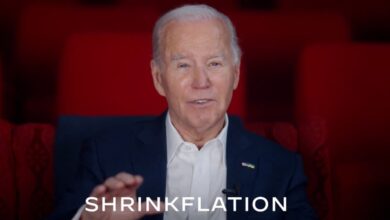
Biden FTC Competition Mergers Under Scrutiny
Biden FTC competition mergers are at the forefront of antitrust discussions. This analysis delves into the Biden administration’s approach to merger reviews, examining the FTC’s actions, economic impacts, political context, industry-specific examples, legal framework, and potential future trends. We’ll explore the reasons behind these challenges, comparing them to past administrations and highlighting the key players involved.
The Biden administration’s stance on mergers reflects a renewed focus on competition. This shift has led to increased scrutiny of proposed mergers across various sectors, particularly in tech, healthcare, and retail. This analysis will provide a comprehensive overview of the issues involved.
Biden’s FTC Approach to Mergers
The Biden administration has prioritized antitrust enforcement and merger reviews, aiming to protect competition and prevent monopolies from forming. This approach reflects a belief that robust competition is crucial for innovation, lower prices, and a stronger economy. The Federal Trade Commission (FTC) under the Biden administration has been actively involved in challenging mergers that it deems anti-competitive.
Stated Policy Goals
The Biden administration’s stated policy goals regarding antitrust enforcement and mergers are focused on preserving competition in the marketplace. This includes a commitment to challenging mergers that could harm competition and lead to higher prices or reduced innovation. The FTC, under this administration, has sought to strengthen antitrust laws and enforcement mechanisms to address potential anti-competitive practices.
Specific Actions by the FTC
The FTC has taken several specific actions under the Biden administration to challenge mergers. These actions include:
- Initiating investigations into mergers across various sectors. These investigations assess the potential impact of the proposed merger on market competition. For example, the FTC has initiated investigations into mergers in the pharmaceutical, technology, and healthcare industries.
- Filing lawsuits to block mergers that the FTC deems anti-competitive. The FTC’s legal challenges aim to prevent mergers that could harm competition by creating or strengthening monopolies.
- Collaborating with other agencies and stakeholders to promote competition. This includes engaging with other federal agencies, state attorneys general, and industry representatives to foster a more competitive marketplace.
Recent Merger Cases
The FTC has intervened in several recent merger cases. These cases demonstrate the administration’s commitment to preserving competition. Examples include:
- The proposed merger of two major grocery chains. The FTC argued that the merger would result in higher prices and reduced choices for consumers. The case highlighted the FTC’s focus on protecting competition in the grocery industry.
- The proposed merger of two leading pharmaceutical companies. The FTC raised concerns about the potential for reduced innovation and higher drug prices. The case illustrated the FTC’s vigilance in scrutinizing mergers in the pharmaceutical sector.
- The proposed acquisition of a major tech company by another. The FTC questioned whether the acquisition would lead to anti-competitive outcomes, potentially stifling innovation and competition in the technology sector.
Comparison with Previous Administrations
| Aspect | Biden Administration | Previous Administrations (Example: Trump) |
|---|---|---|
| Focus | Preserving competition and preventing monopolies | Focus varied; some administrations showed a less stringent approach to mergers. |
| Enforcement Actions | Increased scrutiny of mergers and initiated numerous legal challenges | Varying levels of enforcement, with fewer actions in some instances. |
| Stated Policy | Clear emphasis on protecting competition | Policy statements sometimes less explicit or focused on different aspects. |
Economic Impacts of Mergers: Biden Ftc Competition Mergers

Mergers, while often presented as a means to bolster economic strength, carry complex implications that extend beyond immediate financial gains. Understanding these implications is crucial for assessing the true impact on consumers, industries, and the overall economy. This exploration delves into the potential positive and negative economic consequences of mergers, examining various scenarios and the resulting effects on consumer prices and industry structures.The economic ramifications of mergers are multifaceted, encompassing a spectrum of potential benefits and drawbacks.
Positive impacts, such as increased efficiency and innovation, often drive the pursuit of such strategies. However, negative consequences, such as reduced competition and higher prices, represent a critical counterpoint to consider. This analysis aims to present a balanced view of these impacts, providing a nuanced understanding of the potential outcomes.
Potential Positive Economic Impacts
Mergers can lead to significant efficiencies, particularly when combining complementary resources or eliminating redundant operations. This streamlining can translate to lower production costs, enabling companies to offer products at more competitive prices, potentially benefiting consumers. Furthermore, the increased scale of operations can allow for economies of scope, facilitating research and development, thus fostering innovation and the creation of new products and technologies.
For instance, a merger between two pharmaceutical companies might allow for quicker and more cost-effective development of new drugs.
Potential Negative Economic Impacts
Reduced competition is a significant concern following a merger. When two or more competitors consolidate, the remaining entity often gains a larger market share, reducing the variety of choices available to consumers and potentially leading to higher prices. This diminished competitive landscape can discourage innovation as the lack of competitive pressure might lead to complacency. For example, a merger between two dominant grocery chains could lead to less price competition and potentially higher prices for consumers.
Comparison of Merger Scenarios and Their Economic Effects
The economic effects of a merger depend heavily on the specific scenario. A merger between two small companies in a fragmented market might have minimal impact on overall competition, whereas a merger between two major players in a concentrated market could lead to a substantial shift in market dynamics. A merger of complementary businesses can yield efficiencies, whereas a merger of competing businesses could reduce consumer choice and potentially harm innovation.
Impact on Consumer Prices
The FTC’s actions in scrutinizing mergers directly influence consumer prices. By preventing mergers that would lead to significant reductions in competition, the FTC aims to maintain a competitive marketplace, thus preventing price increases that would otherwise harm consumers. The FTC’s analysis of market concentration and the potential impact on consumer choice is a critical component in their decision-making process.
Biden’s FTC competition mergers are definitely a hot topic right now, and they’re raising some serious questions about market dominance. Meanwhile, the recent events surrounding the armorer Alec Baldwin’s Rust shooting incident armorer alec baldwin rust shooting highlight the need for clearer safety regulations in the film industry. Ultimately, these different issues both point to a broader conversation about oversight and accountability in various sectors, making the FTC’s approach to competition mergers even more critical.
Variations Across Different Sectors
The economic impacts of mergers vary significantly across sectors. In highly concentrated industries, mergers can have a more substantial impact on competition and consumer prices than in more fragmented markets. For instance, the impact of a merger in the airline industry could be different from a merger in the agricultural sector, due to differing levels of market concentration and the nature of competition.
Economic Benefits and Drawbacks of Mergers
| Economic Benefits | Economic Drawbacks |
|---|---|
| Increased efficiency through resource consolidation | Reduced competition, potentially leading to higher prices |
| Economies of scale and scope, driving innovation | Diminished consumer choice and reduced incentives for innovation |
| Potential for cost reductions, benefiting consumers | Increased market power, potentially leading to anti-competitive practices |
| Access to new markets and technologies | Less variety of products and services for consumers |
Political Context of Merger Scrutiny
The Biden administration’s approach to merger scrutiny reflects a complex interplay of economic, political, and social factors. The FTC, under this administration, has taken a more interventionist stance than in previous years, often citing concerns about market concentration and consumer harm. This heightened scrutiny has led to significant debate about the appropriate balance between promoting competition and fostering economic growth.The political climate surrounding mergers is not neutral.
Political considerations, including public pressure, lobbying efforts, and ideological positions, significantly influence the FTC’s decisions and the public perception of these decisions. Understanding these political factors is crucial for analyzing the effectiveness and fairness of the Biden administration’s merger policy.
Key Political Arguments for Intervention
The Biden administration frequently emphasizes the importance of preserving competition in the American economy. Arguments justifying intervention in mergers often center on concerns about reduced consumer choice, increased prices, and diminished innovation. For example, the FTC has cited potential anti-competitive effects in mergers across various sectors, including technology, healthcare, and agriculture. These arguments are often framed within a broader narrative of protecting consumers and promoting fair markets.
Political Considerations Influencing FTC Decisions
Several political considerations shape the FTC’s decisions on merger cases. The administration’s broader economic policy agenda, including support for small businesses and workers, influences the agency’s approach. Furthermore, the political implications of particular decisions, such as the potential impact on specific industries or political constituencies, are undoubtedly considered. Public pressure and media attention on certain mergers can also play a significant role.
This political context highlights the dynamic relationship between economic policy, political ideology, and regulatory action.
Role of Lobbying and Political Pressure
Lobbying efforts significantly impact the merger debate. Powerful corporations and industry groups frequently engage in lobbying to influence the FTC’s decisions. These efforts can involve direct communication with FTC officials, public relations campaigns, and support for legislation favorable to their interests. Political pressure, originating from various sources, including interest groups and elected officials, also plays a role in shaping the FTC’s stance on specific mergers.
Comparison with Previous Administrations
The political environment surrounding merger scrutiny under the Biden administration differs from that of previous administrations. The emphasis on antitrust enforcement has been a key difference. Previous administrations sometimes prioritized fostering economic growth over aggressive antitrust interventions. The current administration, however, appears to be taking a more active and interventionist approach to mergers. This shift reflects a different political perspective on the role of antitrust enforcement in the American economy.
Role of Public Opinion
Public opinion plays a significant role in shaping policy regarding mergers. Public perception of specific mergers and the FTC’s actions influences political discourse and potentially impacts the FTC’s decisions. Concerns about monopolies, price increases, and the impact on consumers drive public interest in these cases. Media coverage, social media discussions, and public forums often reflect public sentiment, which can exert pressure on policymakers and regulatory agencies.
Key Political Actors and Their Positions
| Political Actor | Position on Mergers |
|---|---|
| FTC Commissioners | Decisions based on economic analysis and legal precedent, with varying degrees of interventionism. |
| Congressional Representatives | Varying stances based on constituents’ interests and political ideologies. Some may support stricter enforcement, while others may prioritize economic growth. |
| Industry Groups | Generally seek to minimize government intervention and protect their members’ interests. |
| Consumer Advocacy Groups | Advocate for stricter merger enforcement to protect consumer interests and prevent monopolies. |
| Economic Think Tanks | Provide analysis and recommendations on merger policy, often based on economic theories and empirical data. |
Industry-Specific Examples

The Federal Trade Commission (FTC) plays a crucial role in ensuring fair competition across various industries. Analyzing merger challenges across sectors reveals patterns in the FTC’s approach and the arguments used by both the agency and the merging companies. Understanding these dynamics is essential for evaluating the economic and political implications of proposed mergers.
Tech Industry Mergers
The tech sector is particularly scrutinized due to its rapid growth and potential for market dominance. Mergers in this industry often raise concerns about stifled innovation and reduced consumer choice. A prominent example is the FTC’s challenge to the proposed merger between two major social media platforms. The FTC argued that this merger would lead to a substantial reduction in competition, potentially harming consumers and stifling innovation in the sector.
The merging companies countered that the merger would foster synergies and efficiencies, ultimately benefiting consumers with enhanced services. This highlights the balancing act the FTC faces in determining whether potential benefits outweigh the potential for anti-competitive effects.
Healthcare Industry Mergers
The healthcare sector is another area of intense scrutiny, as mergers can impact access to care and pricing. One example involves a proposed merger between two major hospital systems. The FTC argued that the merger would result in a significant reduction in competition, potentially leading to higher prices and reduced choices for patients. The merging companies countered that the merger would enable them to offer more comprehensive services and improve healthcare access in underserved areas.
Retail Industry Mergers, Biden ftc competition mergers
Mergers in the retail sector can also have significant impacts on consumer prices and availability of goods. A notable case involved the proposed merger of two large retail chains. The FTC raised concerns about the potential for reduced competition and higher prices for consumers. The merging companies contended that the merger would improve efficiency and allow them to offer better prices and selection to consumers.
Biden’s FTC is tackling competition concerns in mergers, a crucial area of focus. Recent high-profile cases highlight the need for robust oversight. Meanwhile, the tragic Disney World allergy death lawsuit, as reported in disney world allergy death lawsuit , underscores the importance of safety regulations in public spaces. Ultimately, these issues are intertwined with the broader conversation about responsible corporate behavior and the need for effective government oversight of big businesses.
Comparison of Merger Challenges Across Industries
Analyzing merger challenges across different industries reveals some common themes. In the tech industry, the FTC frequently focuses on the potential for market dominance and stifled innovation. In healthcare, the primary concern is access to care and pricing. In retail, the FTC’s focus often centers on competition and consumer pricing. These differences highlight the nuanced approach the FTC takes when evaluating mergers in different sectors.
Biden’s FTC competition mergers are definitely a hot topic right now, and they’re likely impacting things like the housing market near NYC. Housing market near NYC fluctuations could be a ripple effect from these antitrust actions. Ultimately, these mergers will likely reshape the competitive landscape, affecting everything from affordability to supply in the long run.
Table: Frequency of Merger Challenges by Industry
| Industry | Frequency of Merger Challenges |
|---|---|
| Tech | High |
| Healthcare | Medium |
| Retail | Medium |
| Other (e.g., Energy, Finance) | Low-Medium |
This table provides a general overview. The frequency of merger challenges can vary depending on specific market conditions and the particular circumstances of each case.
Legal Framework for Merger Review
The Federal Trade Commission (FTC) plays a crucial role in ensuring fair competition in the marketplace. A key aspect of this role is scrutinizing mergers and acquisitions to prevent anti-competitive outcomes. Understanding the legal framework governing these reviews is essential for comprehending the complexities of merger enforcement. This framework, built upon antitrust laws, seeks to balance the benefits of economic consolidation with the preservation of a competitive environment.The FTC’s approach to merger review is rooted in the principle of promoting competition.
Mergers that could substantially lessen competition in a relevant market are subject to scrutiny. This scrutiny is not arbitrary; it is based on established legal standards and precedents that guide the FTC’s decision-making process. The legal standards used to evaluate mergers often involve assessing the potential impact on consumer welfare, including price increases, reduced innovation, and diminished choice.
Biden’s FTC competition mergers are a hot topic right now, but it’s hard to ignore the current geopolitical climate. The recent efforts for a cease-fire between Israel and Hamas, detailed in this insightful piece on biden israel hamas cease fire , highlight the complex challenges Biden faces. Ultimately, these competing priorities will likely impact the FTC’s approach to mergers and acquisitions in the coming months.
Legal Standards for Evaluating Mergers
The FTC employs a multi-faceted approach to evaluate mergers, drawing upon legal standards that are rooted in the Clayton Act and other antitrust laws. These standards are not absolute but rather tools for evaluating the likely effects of a merger on competition. The FTC assesses the likely impact of a merger by examining the market structure before and after the merger, focusing on the relevant market, the merging firms’ market share, and potential barriers to entry.
Legal Precedents Shaping FTC’s Approach
Numerous legal precedents have shaped the FTC’s approach to merger challenges. These precedents provide context and guidance for assessing the likely impact of mergers on competition. Courts have established various tests, such as the “failing firm defense” and the “efficiency gains” arguments, which the FTC must consider during its analysis. The FTC carefully considers how these precedents apply in specific merger cases.
Cases such as the analysis of mergers in the airline, telecommunications, and pharmaceutical industries offer concrete examples of how the FTC uses these precedents to reach its conclusions.
Relevant Sections of the Clayton Act and Other Antitrust Laws
The Clayton Act, along with other antitrust laws, forms the foundation of the FTC’s authority to review mergers. Section 7 of the Clayton Act prohibits mergers that may substantially lessen competition. Other relevant laws, such as the Sherman Act, provide additional tools for analyzing mergers and acquisitions. The FTC’s interpretation and application of these laws are crucial to the process.
Sections of the Clayton Act, including the prohibition of mergers that may substantially lessen competition, are vital to this process.
Application of Legal Standards in Practice
The FTC applies these legal standards in a practical manner, considering various factors. Market share data is a critical component in this process. The FTC scrutinizes market share concentration, analyzing how a merger might shift the market balance of power and potentially harm consumers.
Biden’s FTC competition mergers are definitely a hot topic right now, sparking debate about market dominance and fair play. However, it’s easy to get caught up in the headlines, and sometimes, it’s helpful to step back and consider other important issues. Like the recent story about grief being for people, as highlighted in the poignant piece “grief is for people sloane crosley” grief is for people sloane crosley.
Ultimately, these issues, like the FTC’s focus on competition, reflect larger societal concerns about fairness and balance in a dynamic economy.
Examples of Market Share Data Analysis
The FTC utilizes market share data to assess the potential impact of mergers. For instance, a merger between two firms holding a significant portion of the market share in a particular industry could lead to a more concentrated market structure. This concentration may reduce competition, potentially increasing prices for consumers and decreasing innovation. The FTC often compares pre-merger and post-merger market shares to identify any substantial lessening of competition.
The FTC meticulously analyzes data from various industries to understand how a merger will affect the marketplace. For instance, if two firms holding 30% and 20% market share merge, the resulting 50% market share concentration could raise concerns.
Key Legal Provisions Regarding Mergers
| Legal Provision | Description |
|---|---|
| Section 7 of the Clayton Act | Prohibits mergers and acquisitions that may substantially lessen competition. |
| Sherman Act | Provides additional tools for analyzing mergers, addressing anti-competitive behavior. |
| Market Share Concentration | Analysis of pre- and post-merger market shares to identify substantial lessening of competition. |
| Relevant Market Definition | Determining the appropriate market boundaries for merger analysis, considering product substitutes and geographic scope. |
| Potential Barriers to Entry | Examining factors that hinder new firms from entering the market, impacting competitive pressures. |
Potential Future Trends
The landscape of merger activity and FTC enforcement is constantly evolving. Understanding potential future trends is crucial for businesses navigating the regulatory environment. Technological advancements, global competition, and shifts in regulatory frameworks all play a significant role in shaping the future of mergers and acquisitions. This exploration delves into these potential future trends and their implications.
Predicting Future Merger Activity
The volume and types of mergers are likely to continue to be influenced by economic conditions, industry consolidation pressures, and technological advancements. The pursuit of efficiency gains and market share expansion will likely drive ongoing consolidation in many sectors. Examples of this include the ongoing consolidation in the telecommunications sector, and the pharmaceutical industry. Specific sectors where consolidation is anticipated will depend on the interplay of economic growth and industry dynamics.
Technological Advancements and Merger Reviews
Technological advancements will undoubtedly reshape how mergers are reviewed. The rise of artificial intelligence, big data, and digital platforms is creating new complexities and opportunities for market dominance. Merger reviews will need to adapt to these changes, scrutinizing potential anti-competitive effects in the digital space. This may involve analyzing the impact of data ownership and control in mergers, as well as the potential for algorithmic bias to influence market outcomes.
A significant aspect of this will be the increasing ability of the FTC and other regulatory bodies to utilize data analysis and modeling to identify and quantify potential anti-competitive effects.
Global Competition and Merger Challenges
Global competition will continue to intensify, leading to more cross-border mergers and acquisitions. The FTC and other regulatory bodies will need to carefully consider the implications of such transactions on global markets and consumer welfare. Increased international scrutiny of mergers is likely to arise from concerns about the potential for anti-competitive practices to impact consumers globally. An example of this is the scrutiny of global tech giants’ acquisitions of smaller companies, and how these may influence global market share and innovation.
Regulatory Environment Changes and Implications
Changes in the regulatory environment, including potential shifts in antitrust enforcement priorities, will impact the outcomes of merger reviews. The evolving understanding of competition in the digital age may necessitate adjustments to existing merger guidelines and enforcement strategies. This may involve the development of new guidelines specific to the digital economy. Examples include changes in the way the FTC evaluates data-related mergers, and the potential for new legislation targeting algorithmic bias in mergers.
Navigating Merger Reviews
Companies will need to develop strategies to navigate the evolving regulatory landscape. This involves proactive engagement with regulators, thorough due diligence, and strong legal counsel to mitigate potential risks. A significant factor for companies is to understand and adapt to the changing perspectives of the FTC and other regulatory bodies, which can affect the outcomes of merger reviews.
Potential Future Scenarios and Implications
| Potential Future Scenario | Associated Implications |
|---|---|
| Increased scrutiny of digital mergers | Higher regulatory barriers to entry, potential for more complex and prolonged reviews, and potentially higher costs for companies seeking to acquire digital businesses. |
| Global competition intensifying | Increased cross-border merger reviews, greater emphasis on global market effects, and potential for international regulatory cooperation to address anti-competitive practices. |
| Shifting regulatory priorities | Potential changes in merger guidelines, new enforcement strategies, and greater focus on consumer welfare in the context of emerging technologies. |
| Technological advancements in data analysis | Enhanced ability to identify and quantify potential anti-competitive effects, increased use of data-driven models in merger reviews, and potential for increased complexity and sophistication in merger investigations. |
Epilogue
In conclusion, the Biden FTC competition mergers initiative underscores a significant shift in antitrust enforcement. The scrutiny of mergers, while prompting debate on economic impacts and political motivations, aims to maintain a competitive marketplace. Looking ahead, the evolving regulatory landscape and technological advancements will continue to shape future merger reviews. This analysis highlights the complexities and multifaceted nature of these decisions.
FAQ Guide
What are the key legal standards used by the FTC to evaluate mergers?
The FTC uses legal standards to evaluate mergers, considering factors such as market share, potential anti-competitive effects, and whether the merger significantly reduces competition. These standards are rooted in antitrust laws like the Clayton Act.
How do technological advancements influence merger reviews?
Technological advancements can alter market dynamics, making merger reviews more complex. The FTC needs to adapt its approach to account for new technologies and their potential effects on competition.
What are some examples of industries where merger challenges are frequent?
Specific industries, particularly tech and healthcare, have seen frequent merger challenges under the Biden administration. The FTC’s scrutiny in these sectors often stems from concerns about potential monopolies or diminished consumer choice.
What are the potential future trends in merger activity and FTC enforcement?
Future merger activity could be influenced by global competition and technological shifts. The FTC’s enforcement strategies might also evolve to address these emerging trends and challenges.






